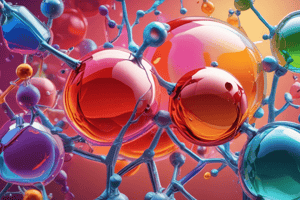Podcast
Questions and Answers
What is the product obtained from the reduction of aldehydes using Pd and hydrogen?
What is the product obtained from the reduction of aldehydes using Pd and hydrogen?
- Alcohol (correct)
- Alkane
- Alkyl halide
- Ketone
Which reagent is NOT commonly used for the reduction of esters?
Which reagent is NOT commonly used for the reduction of esters?
- Na/C2H5OH
- LiAlH4
- NaBH4
- H2SO4 (correct)
What reaction leads to the formation of an alcohol from alkyl halides?
What reaction leads to the formation of an alcohol from alkyl halides?
- Hydrolysis reaction
- Nucleophilic substitution (correct)
- Elimination reaction
- Addition reaction
Which of the following transformations involves a hydrolysis step?
Which of the following transformations involves a hydrolysis step?
What is the result of the reaction between NaNO2 and HCl when starting with a primary amine?
What is the result of the reaction between NaNO2 and HCl when starting with a primary amine?
Which compound is a weaker acid than phenol?
Which compound is a weaker acid than phenol?
What product is formed when an ether is treated with HI?
What product is formed when an ether is treated with HI?
Which statement accurately compares the solubility of n-butanol and t-butanol in water?
Which statement accurately compares the solubility of n-butanol and t-butanol in water?
Which of the following assertions is TRUE regarding the boiling point of alcohol compared to hydrocarbons?
Which of the following assertions is TRUE regarding the boiling point of alcohol compared to hydrocarbons?
How can o-nitrophenol and p-nitrophenol be separated?
How can o-nitrophenol and p-nitrophenol be separated?
Which statement correctly matches the compounds with their reagents?
Which statement correctly matches the compounds with their reagents?
What is the primary outcome of the Willgerodt reaction?
What is the primary outcome of the Willgerodt reaction?
What type of bonding primarily affects the boiling point of alcohols?
What type of bonding primarily affects the boiling point of alcohols?
What is the product of the reaction involving C2H5OH, 4I2, and 3Na2CO3?
What is the product of the reaction involving C2H5OH, 4I2, and 3Na2CO3?
Which reagent converts a 1º alcohol to an aldehyde?
Which reagent converts a 1º alcohol to an aldehyde?
Which compound is formed during the mononitration of 3-methylphenol?
Which compound is formed during the mononitration of 3-methylphenol?
What is the final product of the oxidation of propan-1-ol with alkaline KMnO4?
What is the final product of the oxidation of propan-1-ol with alkaline KMnO4?
Which reagent is used to reduce butan-2-one to butan-2-ol?
Which reagent is used to reduce butan-2-one to butan-2-ol?
What type of reaction results in the formation of 2, 4, 6-tribromophenol from phenol?
What type of reaction results in the formation of 2, 4, 6-tribromophenol from phenol?
Which product is obtained by the reaction of CH3CH=CH2 with BH3 followed by H2O2/OH?
Which product is obtained by the reaction of CH3CH=CH2 with BH3 followed by H2O2/OH?
Which is the major product of the reaction of C6H5OH with Aq. NaOH and CO2?
Which is the major product of the reaction of C6H5OH with Aq. NaOH and CO2?
What is the result of the reaction CH3CH2OH + PCl5?
What is the result of the reaction CH3CH2OH + PCl5?
Which compound is known as ‘Y’ when etherial solution of compound ‘X’ reacts with Mg?
Which compound is known as ‘Y’ when etherial solution of compound ‘X’ reacts with Mg?
Why does phenol have a smaller dipole moment than CH3OH?
Why does phenol have a smaller dipole moment than CH3OH?
Which of the following is the correct order of boiling points for the compounds C2H5 – O – C2H5, C4H9COOH, C4H9OH?
Which of the following is the correct order of boiling points for the compounds C2H5 – O – C2H5, C4H9COOH, C4H9OH?
What distinguishes CH3OH from C2H5OH?
What distinguishes CH3OH from C2H5OH?
Which reaction converts propene to propan-2-ol?
Which reaction converts propene to propan-2-ol?
Why do ethers have relatively low reactivity?
Why do ethers have relatively low reactivity?
Which of the following is an appropriate method for the preparation of 1-methoxy-4-nitrobenzene?
Which of the following is an appropriate method for the preparation of 1-methoxy-4-nitrobenzene?
What is the reason that lower alcohols are soluble in water while higher alcohols are not?
What is the reason that lower alcohols are soluble in water while higher alcohols are not?
What is the product when ethyl alcohol is heated with red phosphorus and hydrogen iodide?
What is the product when ethyl alcohol is heated with red phosphorus and hydrogen iodide?
Which alcohol is expected to have a higher boiling point based on intermolecular forces?
Which alcohol is expected to have a higher boiling point based on intermolecular forces?
What is the conversion process from ethanol to ethene called?
What is the conversion process from ethanol to ethene called?
Which isomer of nitrophenol is more volatile?
Which isomer of nitrophenol is more volatile?
What is the result of phenol reacting with iron(III) chloride?
What is the result of phenol reacting with iron(III) chloride?
In electrophilic substitution reactions, how does phenol differ from benzene?
In electrophilic substitution reactions, how does phenol differ from benzene?
What bond is cleaved during the reaction of alcohol to form an alkene?
What bond is cleaved during the reaction of alcohol to form an alkene?
Flashcards are hidden until you start studying
Study Notes
Acid Strength Comparison
- 4-Methoxy phenol is a weaker acid than phenol due to the electron-donating effect of the methoxy group.
- 3, 5-Dinitrophenol is a stronger acid than phenol because of the electron-withdrawing nitro groups.
- 4-Methyl phenol is weaker than phenol as the methyl group has a slight electron-donating effect.
- 4-Nitrophenol is stronger than phenol due to the electron-withdrawing nature of the nitro group.
Ether Reactions with HI
- An ether treated with HI yields CH2I when an alkyl group is present.
- Alternatively, heating with HI can produce CH2OH, indicating substitution.
n-Butanol vs. t-Butanol
- n-Butanol and t-butanol differ in water solubility; t-butanol is generally more soluble.
- n-Butanol has a higher boiling point than t-butanol due to its ability to form more hydrogen bonds.
Assertion and Reason Questions
-
Assertion: Alcohols have higher boiling points than hydrocarbons of similar molecular mass.
- Reason: Alcohols exhibit intramolecular hydrogen bonding.
-
Assertion: O-isomer of nitrophenol can be distilled due to steam volatility.
- Reason: O-isomer is steam-volatile due to chelation; p-isomer is not due to hydrogen bonding.
Matching Columns
- A: Methanol and ethanol – P: Lucas reagent
- B: Phenol and cyclohexanol – Q: Sodium metal
- C: n-propyl alcohol and tert-butyl alcohol – R: Iodoform test
- D: Methanol and diethyl ether – S: Ferric chloride
Reactions and Mechanisms
- Williamson’s synthesis involves alkoxide reacting with an alkyl halide.
- The Reimer-Tiemann reaction involves formylation of phenols.
Chemical Properties of Phenol
- Phenol has a smaller dipole moment than methanol due to resonance stabilization.
- Phenol can participate in electrophilic substitution due to its electron-rich benzene ring.
Practical Applications
- 2,4,6-Trinitrophenol, known as picric acid, can be synthesized from phenol with nitric acid.
- Iodoform tests distinguish between ethanol and methanol; ethanol produces a yellow precipitate while methanol does not.
Differences in Boiling Points
- Boiling points vary significantly among ethers, alcohols, and carboxylic acids due to the presence of hydrogen bonding.
Volatility Comparison
- O-nitrophenol is more volatile than p-nitrophenol due to differing intermolecular forces.
Distinguishing Alcohols
- Distinguishing CH3OH from C2H5OH can be achieved using iodoform reaction; the latter will yield a yellow precipitate.
Oxidation of Alcohol
- Propan-1-ol can be oxidized with alkaline KMnO4 to form propanoic acid.
Conclusion
- Various reactions, properties, and comparisons provide insights into the behaviors of alcohols, phenols, and ethers in organic chemistry, serving as a foundation for further study and application.
Studying That Suits You
Use AI to generate personalized quizzes and flashcards to suit your learning preferences.




